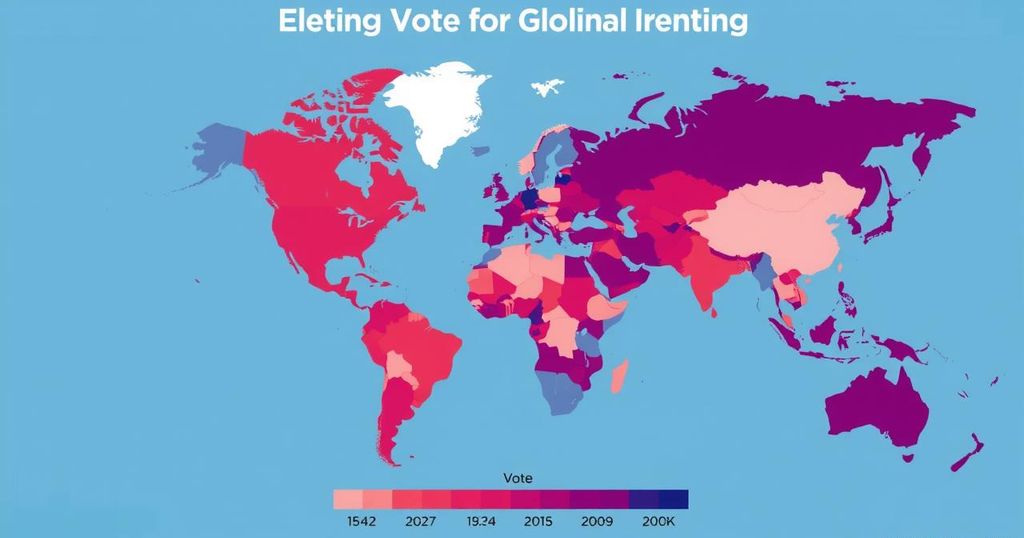Global Electoral Landscape in 2024: Trends and Outcomes

In 2024, over 70 countries held elections, with a collective population of approximately four billion people participating. India led voter engagement, while countries like Tunisia and Rwanda showcased extreme ends of election turnout. Notable results included incumbents winning and some surprising shifts in leadership, reflecting a spectrum of democratic health worldwide and changing political sentiments.
In 2024, elections were held in more than 70 countries, including all 27 members of the European Union participating in the parliamentary elections. This extensive electoral activity covered regions comprising approximately four billion people, nearly half of the global population. Notably, India led the way with the largest democratic exercise in history, featuring a voter turnout average of 61 percent, despite variance among countries. The lowest turnout recorded was 28.8 percent in Tunisia, while Rwanda boasted the highest at 98.2 percent.
Outcomes varied significantly with familiar leaders re-elected, including Narendra Modi in India and Donald Trump in the United States, where Harris stepped in for Biden. Surprising election outcomes occurred as Modi’s party lost its parliamentary majority, and Trump garnered 77.96 million votes. Across the globe, over 1.7 billion people engaged in the electoral process.
Election results indicated a mixture of continuity and change, as incumbents were challenged across multiple nations. Some faced accusations of authoritarian practices, such as Kais Saied and Vladimir Putin, while others reflected a new political landscape, such as Claudia Sheinbaum’s election as Mexico’s first female president. Countries with significant leadership changes included Botswana, where Duma Boko ended the ruling party’s lengthy dominance, and Iceland, where the Social Democratic Alliance achieved a majority.
The electoral response worldwide seemed influenced by various factors; Modi’s coalition-building illustrated societal concern regarding rising authoritarianism and economic issues, particularly given his government’s perceived mishandling of critics and minorities. Meanwhile, several nations experienced political upheaval that highlighted shifting alliances and emerging democratic aspirations. In Ethiopia, a revolutionary scenario concluded with Bashar al-Assad losing power amidst a devastating civil conflict. As socioeconomic challenges persist globally, these elections reflect citizens’ will for change and stable governance.
Election year 2024 has underscored the complexities of global politics, illustrating that electoral processes serve not only as a reflection of public sentiment but also as a litmus test for governance and democratic legitimacy.
The elections held across more than 70 countries in 2024 showcased a range of electoral behaviors and results influenced by local and global factors. These elections not only impacted national politics but also contributed to broader conversations on democracy, governance, and human rights. The widespread participation of roughly half the global population signifies a critical moment in democratic engagement, particularly in nations where political activism has surged in response to government policies and socioeconomic conditions. Precise outcomes, especially those marked by lower turnout, raised questions about public trust in governance and the political process.
The 2024 elections revealed a complex tapestry of transition, stability, and change in leadership worldwide. With established leaders facing challenges in both public support and governance, the outcome of these elections points to a crucial juncture for democratic principles globally. The mixed voter turnout rates suggest varying levels of civic engagement and trust in political systems, while significant shifts in power dynamics in several nations underscore the potential for transformative change. As political landscapes evolve, these results will likely inform the future stability and governance direction in the upcoming years.
Original Source: www.aljazeera.com








